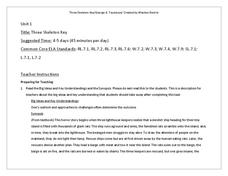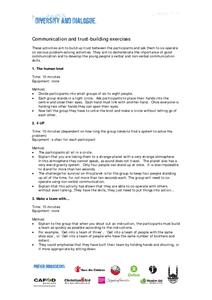IRISS
Exploring Self-Esteem 1: What Is Self-Esteem?
Adolescents explore self-esteem and the various factors that influence a person's sense of self in this four-part lesson series. Through a combination of whole class instruction, small group discussions, and independent work, students...
VT FEED
The Origins of Civilization and Agriculture: Integrating the Study of Food
What role has food played in the rise and changing nature of civilizations? Here you'll find a fantastic set of lessons and materials on such topics as where food is grown in the United States, the food of ancient peoples,...
Smithsonian Institution
Barn Again! Celebrating an American Icon
How do barns serve as a window to a community's past? Here are a series of lessons on the symbolism and historical context of barns throughout American history. Topics include community-building, in-depth primary and secondary source...
Speak Truth to Power
Jamie Nabozny: Bullying: Language, Literature and Life
Class members identify bullying in contemporary texts and role play how they might change those scenes to examples of anti-bullying. They then re-define their initial definitions of bullying and discuss what they would like to see as...
Michigan State University
Gases Matter
Young scientists learn that seeing isn't necessarily believing when it comes to the states of matter. After performing a fun class demonstration that models the difference between solids, liquids, and gases, children complete a series of...
Curated OER
Study Guide for Missing May
Use this comprehensive packet to accompany a study of Missing May by Cynthia Rylant. Starting out with a brief author biography and background information about the novel, this guide includes materials to use throughout the entire novel....
Teens Finding Hope
Thought-Feeling-Behavior Triangle
All actions, good and bad, first begin with an idea. Using these worksheets, help learners become more aware of how their thoughts can spiral into different feelings and behaviors, as well as to practice considering the pros and cons of...
Washoe County School District
Three Skeleton Key
Conduct a close reading of George G. Toudouze's well-known horror story "Three Skeleton Key." This plan breaks up the reading into several steps and provides text-dependent questions to ask along the way. Learners will have the chance to...
Curated OER
Create Your Own Country Project
Young scholars demonstrate their knowledge of geography with this fun, collaborative social studies project. Working in small groups, students develop their very own countries, writing descriptions of their physical location, social...
Diversity and Dialogue
Communication and Trust-Building Exercises
Help learners build trust and develop verbal and non-verbal communication skills with a variety of interactive activities outlined in this resource.
Roald Dahl
The Giraffe and the Pelly and Me
Follow up a reading of The Giraffe and the Pelly and Me by Roald Dahl with this collaborative lesson on teamwork. Starting with a fun team game, learners go on to investigate examples of teamwork in the story before working in small...
National Park Service
What Can We Do?
Motivate young conservationists to stand up and make a change. After learning about the efforts in Cascade Nation Park to reduce carbon emissions in order to preserve the wilderness, students work in groups creating action plans for...
Teaching Tolerance
Reflection: What’s Your FRAME?
Encourage your class to recognize the diversity in the beliefs and backgrounds of their peers. Learners use the acronym FRAME to consider culture, background, and life experiences.
Washington State University
Defining Bullying
How can you recognize bullying? How is verbal bullying different from physical or social bullying, and when has a joke gone too far? Learners use their own experiences and ideas to inform the discussion.
Polar Bears International
Taking Action!
Motivate young scientists to stand up and take action with this environmental science instructional activity. To begin, the class works in small groups brainstorming actions that support the conservation of the earth before creating and...
PBS
Constitution Day
Travel back to 1787 as young scholars investigate the creation of the US Constitution. After first working in small groups to create sets of classroom rules, students go on to read a summary of the Constitution and watch a short video...
Curated OER
Our Classroom Constitution
Develop a system of classroom rules created by the kids, for the kids with this three-part instructional activity series on the US Constitution. After learning about the structure of the Constitution and the government it established,...
ICT Evangelist
Think
With the speed and easy access of online communication today, young learners often do not consider the full implications of their speech. Remind them to THINK (is it true, helpful, inspiring, necessary, and kind) before using...
Center for Civic Education
Martin Luther King Jr. and the Power of Words
It is easy to forget the power that written or spoken word can have in effecting change. Using quotations from such inspirational leaders as Maya Angelou, Mahatma Gandhi, and Martin Luther King Jr., encourage your class members to...
University of Chicago
Using Artifacts for Clues About Identity
Learn about the ancient Near East through a close examination of ancient artifacts. Lead your class into analysis by first observing an artifact as a class. Pupils can then work in pairs to analyze the other artifacts and compile a list...
Center for Civic Education
The Power of Nonviolence: What Is Nonviolence? What Does It Cost?
Your young learners will delve into the language of primary source documents in order to identify the characteristics, benefits, and costs of nonviolence. The lesson plan includes a mix of activities, including an anticipatory activity,...
The New York Times
Collateral Damage? Researching a Connection Between Video Games and Violence
Hook your class into an exploration of and discussion about violence in video games with a cute animal clip and a video game trailer. After a quick discussion about how media can affect mood, class members read a related article and...
Alberta Learning
Great City-states of the Renaissance
Acting as journalists on a team to determine the most influential city-state of Renaissance Italy, your young historians will research, discuss, and compare the rise of Venice, Florence, and Genoa, and their influence in shaping a...
Carolina K-12
EU Movement Role Play
Using role play, a graphic organizer, and discussion, your class members will compare and contrast the movement of people and goods between countries in the European Union before and after the organization was established. This is a...

























